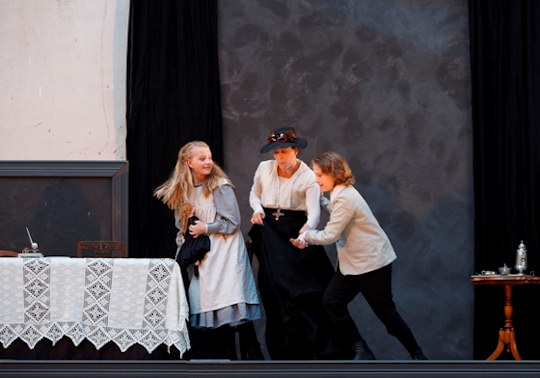 Sweden Britten, The Turn of the Screw: Soloists, Läckö Chamber Orchestra, Simon Phipps (conductor) Läckö Castle, Sweden, 26.7.2011 (NS)
Sweden Britten, The Turn of the Screw: Soloists, Läckö Chamber Orchestra, Simon Phipps (conductor) Läckö Castle, Sweden, 26.7.2011 (NS)
Cast:
Governess – Karolina Andersson
Mrs Grose – Angela Rotondo
Peter Quint – Daniel Frank
Miss Jessel – Nina Ewald
Prologue – Håkan Starkenberg
Miles – Oskar Fagelund Svenberg
Flora – Astrid Montén
Production team:
Musical director and conductor – Simon Phipps
Director/set – Patrik Sörling
Costumes/set – Karin Erskine
Lighting – Markus Granqvist
Makeup – Gunilla Bratt
Swedish translation – Catarina Gnosspelius

The imposing seventeenth-century Läckö Castle lies on an idyllic stretch of the coast of Lake Vänern and is one of a number of European castles to host opera performances in the summer. Previous productions include two Rossini operas and Britten’s Albert Herring, but this summer the castle courtyard is haunted by the ghosts of Bly House. Under the able leadership of Simon Phipps, an experienced conductor with engagements at Sadler’s Wells and the English National Opera under his belt, the artistic standard of Läckö’s opera performances has been consistently high. This year is no exception.
Britten’s chamber opera fits comfortably into the castle courtyard, which has a surprisingly good acoustic thanks to the stone walls on all sides. The main section of the stage is above the orchestra, with smaller sections down stairs on either side of the orchestra. This arrangement (married with astute directing) meant that the impossibility of scene changes had no impact on the experience. The set and costumes (the latter by Karin Erskine, nominated for an Oscar for her costumes for Ingmar Bergman’s Magic Flute) were perfect, adding atmosphere and character to the performance. A special mention should also go to the lighting, which very effectively highlighted the presence of the ghosts and heightened the drama.
Probably the greatest challenge in The Turn of the Screw is to find twelve-year-old soloists capable of both performing some rather exposed vocal parts and acting as if children under terrible stress. In this production Oskar Fagelund Svenberg (Miles) and Astrid Montén (Flora) did very well, particularly when they were together (they were musically at their best when singing their invented psalm in duet). They were in character throughout, which is impressive for such young performers. In particular, Oskar managed his sometimes very exposed part well. While he started his haunting “Malo” solo slightly out of tune he quickly recovered and gripped the audience. (Oskar and Astrid perform alternately with Alexander Chojecki and Tove Nyquist.)
Among the adult soloists Karolina Andersson’s Governess stood out. She fits this role like a glove: her voice fresh, innocent and emotionally vulnerable like her character. Acting a character who swings so suddenly between self-confidence and love for the children to fear and loathing for the evil presence of Quint and Miss Jessel is difficult but Ms Andersson carries it off convincingly. The atmosphere of menace so vividly created by the setting and Britten’s suggestive music does help make her role more natural.
The rest of the cast contained no weak links. Angela Rotondo’s vibrato sometimes obscured the words (a very musical and singable translation of Myfanwy Piper’s libretto into Swedish by Catarina Gnosspelius) but she was otherwise well-suited to her role as Mrs Grose both vocally and dramatically. Håkan Starkenberg had already taken on the role of storyteller while he was reminding the audience to turn off their mobiles and got the opera off to a very good start.
Of the ghosts Daniel Frank’s Peter Quint made the deeper impression. The way his disembodied voice seemed to come from anywhere in the courtyard as he sang his first words was tremendously atmospheric. He also had a powerful stage presence when he was on stage as well as a strong dramatic tenor. Nina Ewald’s Miss Jessel was perhaps less threatening but no less sinister, and was particularly effective when confronting Quint or the Governess.
Special praise must go to the orchestra, who provided excellent accompaniment for the singers and very atmospheric orchestral interludes. Läckö’s audience is not the typical opera crowd, being a bit younger and with a sizable proportion of curious locals and tourists among the diehard opera-lovers. Nevertheless they were all mesmerised by the whole experience, with hardly a movement or cough throughout the performance. Simon Phipps’ sensitive conducting bears much of the credit. Britten’s score is also much more accessible than discussions about tonality and serial technique may suggest (which is why he was successful as a film composer). Mr Phipps is a Britten aficionado, this being his tenth Britten opera, and his strategy of choosing interesting but unusual works rather than crowdpullers is amply vindicated by the artistic success of this production – and the fact that Tuesday night’s performance was completely sold out.
Niklas Smith
Photo © Petter Magnusson